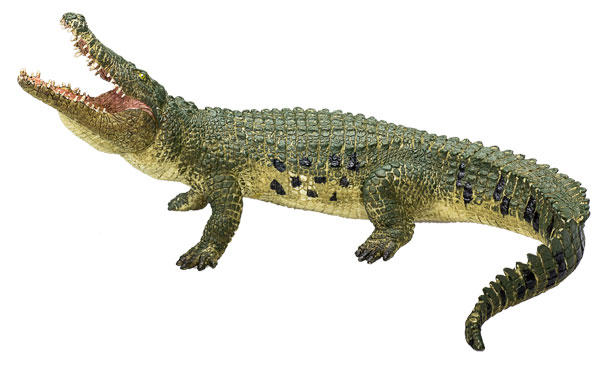Crocodiles Reacting to the Cries of Distressed Hominid Babies
Nile crocodiles react to the sound of hominid babies crying. In a newly published study, the researchers state that crocodiles can detect elevated levels of distress in the cry of babies better than us (Homo sapiens). Their ability to distinguish between different types of cries might be a behaviour that helps support their predatory instincts. Crocodiles able to react to hominid baby sounds might be a preconditioned response associated with targeting prey.
Writing in the “Proceedings of the Royal Society B”, the researchers from the University of Saint-Etienne and Lyon University (France), claim that crocodiles are more responsive to higher-intensity cries.
The picture (above) shows a crocodile model from the Mojo Fun range.
To view the range of Mojo Fun models available from Everything Dinosaur: Mojo Fun Dinosaur and Prehistoric Animal Models.
Behavioural Study of Nile Crocodiles
The scientists exposed Nile crocodiles (Crocodylus niloticus) in a zoo to cries from human, chimpanzee and bonobo infants. The researchers observed the reaction of the crocodiles. Some turned their heads, others moved towards the speakers. It was noted that some crocodiles in the study submerged themselves. Hiding in the water might be interpreted as predatory behaviour, as these reptiles tend to ambush prey from a submerged position.
The study used two types of baby human cries, during bath time at home with the parents and the cries of babies being vaccinated. The vaccination cries were interpreted as being higher intensity crying, the babies having elevated stress levels. Some of the more intense baby cries caused a much higher percentage of the crocodiles to react. To see if there were specific qualities of those sounds that made the crocodiles respond, the researchers also examined some of the acoustic properties of the cries being tested.
It was discovered that the crocodilians were more responsive to crying sounds with more energy in the higher sound frequencies. They also reacted to crying sounds with irregularities in the sound wave patterns. These cries are associated with higher levels of distress.
Sensitive Crocodiles or Simply Curious Crocodilians
Distress vocalisations alert a variety of terrestrial vertebrates. There are shared acoustic features that alert parents and conspecifics and cause them to react to the sounds. This study suggests that acoustic traits used to decode distress may vary between species. This research suggests that crocodiles are sensitive to the degree of distress encoded in the vocalisations of phylogenetically very distant vertebrates. It could be a predatory response, or perhaps the responses reflect a level of curiosity within crocodilians.
Curiosity is not a trait readily associated with these ancient reptiles.
A comparison of these results with those obtained with human subjects confronted with the same sounds further indicates that crocodiles and humans use different acoustic criteria to assess the cries of infants. Interestingly, the acoustic features driving crocodile reactions are likely to be more reliable markers of distress than those used by humans.
The scientific paper “Crocodile perception of distress in hominid baby cries” by Julie Thévenet, Léo Papet, Gérard Coureaud, Nicolas Boyer, Florence Levréro, Nicolas Grimault and Nicolas Mathevon published in the Proceedings of the Royal Society B.
Visit the award-winning Everything Dinosaur website: Everything Dinosaur.


